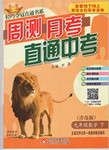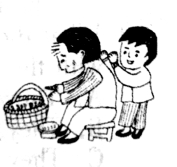
Last night I was driving from Harrisburg to Lewisburg, a distance of about eighty miles. It was late. Several times I got stuck behind a slow-moving truck on a narrow road with a solid white line on my left, and I became increasingly impatient.
At one point along an open road, I came to a crossing with a traffic light. I was alone on the road by now, but as I drove near the light, it turned red and I made a stop. I looked left, right and behind me. Nothing. Not a car, no suggestion of car lamps, but there I sat, waiting for the light to change, the only human being for at least a mile in any direction.
I started wondering why I refused to run the light. I was not afraid of being caught, because there was clearly no policeman around, and there certainly would have been no danger in going through it.
Much later that night, the question of why I'd stopped for that light came back to me. I think I stopped because it's part of a contract(契约) we all have with each other. It's not only the law, but it's an agreement we have, and we trust each other to honor it: we don't go through red lights.
Trust is our first inclination(倾向). Doubting others does not seem to be natural to us. The whole construction of our society depends on mutual(相互)trust, not distrust. We do what we say we'll do;we show up when we say we'll show up; and we pay when we say we'll pay. We trust each other in these matters, and we're angry or disappointed with the person or organization that breaks the trust we have in them.
I was so proud of myself for stopping for the red light that night.
1.Why did the author get impatient while driving?
A. He was lonely on the road.
B. He was slowed down by a truck.
C. He got tired of driving too long.
D. He came across too many traffic lights.
2.What was the author's immediate action when the traffic light turned red?
A. Stopping still.
B. Driving through it.
C. Looking around for other cars.
D. Checking out for traffic police.
3.The event made the author strongly believe that ________.
A. traffic rules may be unnecessary
B. doubting others is human nature
C. patience is important to drivers
D. a society needs mutual trust
4.Why was the author proud of himself?
A. He kept his promise.
B. He held back his anger.
C. He made a right decision.
D. He followed his inclination
1.B
2.A
3.D
4.C
【解析】
试题分析:文章强调了人与人之间的信任。作者在一个无人的路口停下来候车,他本来可以闯红灯的,但作者没有那样做。回想起来这件事,作者认为人与人之间是存在着相互信任的,这也是社会赖以运作的基础。
1.Several times I got stuck behind a slow-moving truck on a narrow road and I became increasingly impatient”可知,作者有几次被一辆行驶缓慢的卡车挡住了车道,作者变得有点不耐烦了,故选B。
2.it turned red and I made a stop”可知,当信号灯变红时,作者停了下来,故选A。
3.Trust is our first inclination(倾向). ...The whole construction of our society depends on mutual(相互) trust, not distrust.”可知,人们有相互信任的倾向,我们的社会依靠人们之间的相互信任才能运转良好,故选D。
4.for stopping for the red light that night”可知,那天晚上,四周虽然没有车和行人,但作者还是停下来候车了,作者庆幸自己遵守了交通规则,没有破坏人们之间的相互信任,故选C。
考点:生活类短文阅读


 轻巧夺冠周测月考直通中考系列答案
轻巧夺冠周测月考直通中考系列答案科目:高中英语 来源:2015届福建武平第一中学高三上期中英语试卷(解析版) 题型:阅读理解
Single people, especially women, are stigmatized(指责) in our society: We’re all familiar with the image of a sad, lonely woman eating ice cream with her cats in her pajamas on Saturday night. But about 45 percent of US adults aren't married and around one in seven lives alone. This might be you. Research shows that young people's expectations about their marital status (e.g. the desire to be married by 30 and have kids by 32) have little or no relationship to what actually happens to people. So, go with the flow. And, if you're single, you're in good company. Single people spend more time with friends, volunteer more, and are more involved in their communities than married people. Never-married and divorced women are happier, on average, than married women. So, don't buy into the myth of the miserable singleton.
If you do get married, keep going with the flow. Relationship satisfaction, financial security, and happy kids are more strongly related to flexibility in the face of life's challenges than any particular way of organizing families. The most functional families are ones that can bend. So partnering with someone who thinks that one partner should support their families and the other should take responsibility for the house and children is a recipe for disaster. So is being equally rigid about non-traditional divisions of labor. It's okay to have ideas about how to organize your family but your best bet for happiness is to be flexible.
Buying a home is often taken for granted as a stage on the path to adulthood. But the ideal of universal home ownership was born in the 1950s. It's a rather new idea.With such a short history, it's funny that people often insist that buying a house is a fool-proof investment and the best way to secure retirement. In fact, buying a house may not be the best choice for you. The mortgage(按揭) may be less than rent, but there are also taxes, insurance, and the increasingly common Home Owners Association (HOA) fees. You may someday sell the house for more than you bought it but, if you paid interest on a mortgage, you also paid far more than the sale price. You have freedom from a landlord, but may discover your HOA is just as controlling, or worse. And then there's the headache: renting relieves you from the stress of being responsible for repairs. It also offers a freedom of movement that you might cherish.
So be wise and consider all your options.
1.It can be inferred from the passage that_________.
A. many Americans get married by 30 and have kids by 32
B. married women have a happier life than those never-married
C. divorced women lives a miserable life
D. the society tends to have a wrong image about single women
2.According to the passage, what can be a happy family?
A. The happy family is flexible in the face of life’s challenges.
B. The happy family has particular way of organizing families.
C. The happy family believes the traditional divisions of labor.
D. The happy family has relationship satisfaction, financial security and happy kids.
3. The purpose of paragraph 3 is to _______.
A. tell people to rent a house rather than buy a house
B. ask people to think hard about whether to buy a house
C. show people buying a house is foolish
D. tell people buying a house may cost a lot of money
4.The passage mainly tells us _______.
A. how to have a happy family
B. what’s the life of American youth
C. what American youth should know for living a happy life
D. why American youth should be wise when making decisions
查看答案和解析>>
科目:高中英语 来源:2015届福建八县(市联考高三上学期期中英语试卷(解析版) 题型:书面表达
请根据你对右边这幅画的理解用英语写一篇短文。内容要求:

1.描述漫画内容,如情景,人物,动作等。
2.结合自身实际,谈谈你的感想。
3.举例说明你能在尊老爱老方面做些什么。
注意:
1.词数120左右。
2.参考词汇:按摩 massage n.&v.
查看答案和解析>>
科目:高中英语 来源:2015届福建八县(市联考高三上学期期中英语试卷(解析版) 题型:单项填空
During the meeting a young man cried out suddenly and threw his notebook at Ma Yingjiu, ________brought the room to disorder.
A. this B. it
C. and that D. and which
查看答案和解析>>
科目:高中英语 来源:2015届福建三校联考高三上期中英语试卷(解析版) 题型:其他题
写作(共两节,满分35分)
第一节 短文填词(共10小题;每小题1分, 满分10分)
阅读下面短文,根据以下提示:1)汉语提示,2)首字母提示,3)语境提示,在每个空格内填入一个适当的英语单词,所填单词要求意义准确,拼写正确,并将该词完整地写在答题卡中相应的横线上。
While asleep, a lion was waken by a mouse running over his face. The lion 1. c________ it and opened his huge jaws to swallow the tiny creature. The mouse begged 2._______ its life. “Please let me go,” it cried, “and one day I will repay your 3.____________(善意).” The idea of so small a creature ever doing anything for him amused the lion4.________ much that he laughed and let it go. But the mouse’s chance came, after all. One day the lion got5.__________(困住)in a net which had been spread by some hunters. He let6._________ a very loud, deep cry. “That may be the very lion7._______ once freed me,” the mouse said to itself, remembering its promise. And it ran to the spot to see whether it could help. With its sharp little8.__________ (牙齿) the mouse began to bite at the ropes, and succeeded in9.s________ the lion free. “There!” said the mouse, “You laughed at me when I promised I would repay you; now you know that it is10.p____________ for even a mouse to help a lion.”
查看答案和解析>>
科目:高中英语 来源:2015届福建三校联考高三上期中英语试卷(解析版) 题型:单项填空
Many people nowadays refer to themselves as chihuo—people who love to eat and are satisfied and excited when ________ delicious food.
A. tasted B. to taste
C. tasting D. having tasted
查看答案和解析>>
科目:高中英语 来源:2015届福建三校联考高三上期中英语试卷(解析版) 题型:单项填空
Fitness is important in sport, but of at least ________ importance are skills.
A. fair B. reasonable
C. equal D. proper
查看答案和解析>>
科目:高中英语 来源:2015届陕西兴平秦岭中学高三上期中英语试卷(解析版) 题型:单项填空
I love animals and that’s the reason ______ I hate the people who kill wild animals for money.
A. that B. in which
C. which D. why
查看答案和解析>>
科目:高中英语 来源:2015届辽宁大连第二十高级中学高三上期中英语试卷(解析版) 题型:书面表达
假设你是李华。请根据写作要点用英语写一篇周记,记述你周末或在假期中帮助家人做家务的一次经历。
写作要点:
1.做家务的理由;
2.做家务的过程;
3.你的感受。
注意:
词数不少于100字;
开头已给不计入总词数;
不可写真实姓名。注意时态。
I am an 18-year-old middle school student. _________________________
____________________________________________________________________
____________________________________________________________________
____________________________________________________________________
查看答案和解析>>
湖北省互联网违法和不良信息举报平台 | 网上有害信息举报专区 | 电信诈骗举报专区 | 涉历史虚无主义有害信息举报专区 | 涉企侵权举报专区
违法和不良信息举报电话:027-86699610 举报邮箱:58377363@163.com